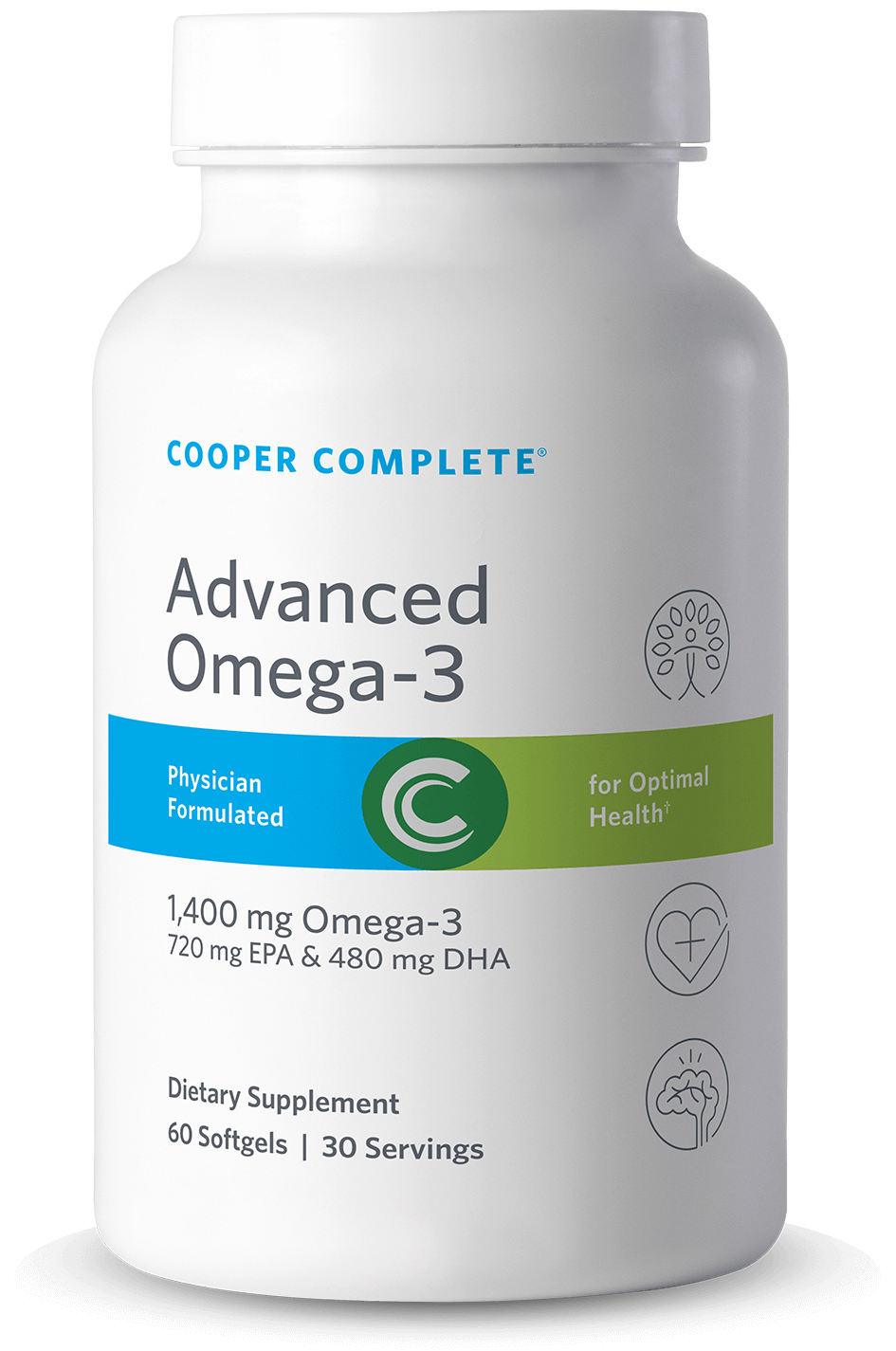Cooper Cardiologist Shares Key VITAL Study Omega-3 Takeaways

After the results of the VITAL (VITamin D and OmegA-3 TriaL) study were announced at the annual American Heart Association meeting in November 2018, you might have seen attention-grabbing headlines such as “Death knell for omega-3 supplements.” However, a careful look at the findings of this study may inspire you to reconsider the health benefits of this important supplement.

Advanced Omega-3 Supplement
Advanced Omega 3 Supplement contains 720 mg EPA, 480 mg DHA, and 200 mg other omega-3 fatty acids in each serving of two lemon-flavored softgels. Omega 3 supplementation supports heart health, cognition, immune, and inflammatory health without any fishy aftertaste.†
$22.98 Add to cartVITAL Study at a Glance
- A randomized, placebo-controlled trial
- ~26,000 participants (men ≥ 50 years of age and women ≥ 55 years of age)
- Treated with either vitamin D3 (50 mcg /2000 IU per day) or placebo and omega-3 fatty acids (1 gram per day) or placebo for the prevention of cancer and cardiovascular disease
- Followed for 3.8 to 6.1 years
Primary Endpoints:
- Being diagnosed with an invasive cancer of any type (all diagnosed cancers)
- Having any of three major cardiovascular events (a “composite” or combination endpoint of myocardial infarction (heart attack), stroke or death from cardiovascular causes) “Death from cardiovascular causes” is a broad category that includes deaths resulting from fatal heart attack, sudden cardiac death, death due to heart failure, death due to stroke, death as a complication of a cardiovascular procedure and death due to cardiovascular hemorrhage (ruptured aneurysm).
The investigators also reported the impact of omega-3 use on a number of separate cardiovascular endpoints:
- heart attack
- stroke
- coronary artery disease
- revascularization (bypass surgery or coronary stents)
VITAL Study Omega-3 and Prevention of Cardiovascular Disease
To put the results in the proper context, it is important to review details about the omega-3 supplement used in the study as well as the blood levels of omega-3 in the participants at baseline and after taking the supplement.
The omega-3 supplement used in this trial was a fish oil capsule containing 840 mg of omega-3 fatty acids, including 460 mg of eicosapentaenoic acid (EPA) and 380 mg of docosahexaenoic acid (DHA).
The Omega-3 Index (the amount of EPA and DHA in the blood) was measured at the start of the study (baseline) in about 60 percent of participants and after one year into the study it was measured in only about six percent of participants.
Participants’ Omega-3 Index
- Baseline (mean±SD): 2.7 ± 0.9 percent in each group
- After One Year: 4.1 % in the omega-3 group; essentially unchanged in the placebo group
The Omega-3 Index has been shown to be inversely associated with cardiovascular risk; that is, the higher the index the lower the risk. An Omega-3 Index of ≥ 8% is associated with the greatest cardioprotection, whereas an index of ≤ 4% is associated with the least.
Because participants had a low Omega-3 Index, to begin with and took only 1 gram of fish oil per day, they did not attain optimal levels on the Omega-3 Index associated with maximal cardioprotection.
During follow-up, there was no difference in the primary composite cardiovascular endpoint (combination of heart attack, stroke or cardiovascular death) between the participants taking omega-3 and the placebo group. This single finding was widely publicized.
As is commonly done in these kinds of studies, the authors looked at the impact of omega-3 use on outcomes in pre-specified subgroups to see if the benefit might be limited to participants with a certain personal or clinical profile. Examples of these subgroups include:
- Men versus women
- Smokers versus non-smokers
- Diabetes versus non-diabetes
- Current users of cholesterol medication versus non-users
- More versus less fish consumption per week
Of all the subgroup analyses, the groups defined by fish consumption demonstrated a significant benefit of omega-3 use. The participants in the omega-3 group with lower fish consumption demonstrated a significant reduction (almost 20 percent) in the risk of having a major cardiovascular event (the primary cardiovascular composite endpoint).
Clinically, this is a very meaningful finding. The findings of this study suggest that if you do not eat one or two servings of fish per week (and most people don’t), you can reduce your risk of heart attack, stroke or death from cardiovascular causes by almost 20 percent simply by taking 1 gram of fish oil every day. Why the investigators did not emphasize this important finding is a mystery.
Benefits of omega-3 supplementation were also demonstrated in the entire omega-3 group in several of the analyses of secondary cardiovascular endpoints. The omega-3 group had fewer fatal and non-fatal heart attacks and less total coronary heart disease (a combination of fatal and non-fatal heart attacks, coronary stents or bypass surgery).
5 Key Takeaways about the VITAL Study Omega-3 and Cardiovascular Disease Prevention
- Before and after supplementation with 1 gram of fish oil, the Omega-3 Index was not in the optimal range for cardioprotection but still showed benefit for some cardiovascular outcomes.
- Participants in the omega-3 group with lower fish consumption demonstrated a significant reduction (almost 20 percent) in having any one of three major cardiovascular events. This is meaningful given weekly fish consumption is generally low in most people.
- In the entire group taking omega-3, there were fewer fatal and non-fatal heart attacks and need for stents or bypass. There was no reduction in stroke risk or overall risk of death.
- The cardioprotective benefits of omega-3 use demonstrated in this study are consistent with basic science research showing omega-3 fatty acids:
- Lower blood pressure
- Reduce the risk of blood clots and vascular inflammation
- Inhibit the growth of atherosclerotic plaque (hardening of the arteries)
- Reduce the tendency to develop abnormal heart rhythms
- Promote blood vessel relaxation
- Supplementation with omega-3 was safe. The incidence of gastrointestinal symptoms, major bleeding episodes or other serious adverse events did not differ significantly between the omega-3 group and the placebo group.
Omega-3 Arm and Cancer Outcomes
During follow-up, there was no difference between the placebo and omega-3 groups in terms of being diagnosed with all invasive cancers combined or individual cancers (breast, prostate or colorectal cancers) or dying from cancer during the follow-up period.
In totality, prior studies with omega-3 supplements have shown a neutral effect on these cancer endpoints, so the authors were not expecting to see a benefit or risk of omega-3 supplements on cancer risk. Rather this study was expected to confirm these prior findings.
If you feel inspired to add omega-3 (or vitamin D) to your daily routine, remember that it is important to talk with your physician first before starting any new supplements.

Dr. Nina Radford is the Director of Clinical Research and a cardiologist at Cooper Clinic. She also wrote a review of the vitamin D arm of the VITAL study.
